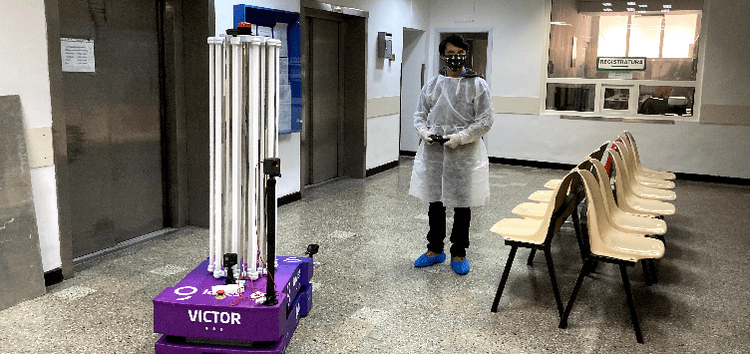
COVID-19 in Romania: at Bucharest hospital, a robot kills the coronavirus with UV rays
COVID-19 in Romania: an autonomous robot called Victor, which kills pathogenic microorganisms including coronavirus using UV-C radiation, is fighting the coronavirus pandemic at a major hospital in Bucharest.
More robots like Victor are on their way to local healthcare institutions, as the manufacturer, Modulab, is scaling up production.
Thanks to an advisory project backed by the EBRD and the European Union EU), robot assembly now takes only one day compared to almost 14 days previously.
The Modulab team has been experimenting with advanced technology for over 15 years, and more than 60 unique prototypes have come to life in the company’s laboratory.
In the past four years, brothers Paul and Matei Popescu focused their technological creativity on robotics, developing a wide range of industrial, humanoid and collaborative (swarm) robots.
They initially designed an autonomous robot for more mundane, industrial scenarios – its capacity to navigate complex environments and avoid obstacles makes it perfect for cleaning or carrying spare parts. However, 2020 gave the robot and its makers a new and heroic purpose in life.
“We knew we had to act fast,” says Ioana Calen-Popescu, Modulab Co-owner and CEO. “The world was heading towards a crisis the likes of which we had never seen before, and we had a secret weapon which could make the difference, quite literally, between life and death.”
As the coronavirus pandemic gripped the world in March, Modulab redesigned the robot and accelerated its development in order to give hospitals in Romania a much-needed weapon against the virus.
By adding powerful ultraviolet C-lamps to the robotic platform, the company created a device that can disinfect an area of 20 m2 in around 10 minutes, including clothing and equipment – everything that the ultraviolet light can reach.
Due to its 5-hour autonomy and remote control feature, the robot has the advantage of being able to move around without involving hospital personnel, thereby protecting human life.
The first robot at the Bucharest University Hospital was named Victor, after Romanian bacteriologist Victor Babes, one of the founders of modern microbiology.
A major local bank bought Victor from Modulab at production cost and donated it to the hospital.
Soon, other robots will be arriving in hospitals across the country and beyond, as well as in office buildings, hotels and other establishments that need help fighting the coronavirus.
With support from the European Union under Horizon 2020, Modulab can now get involved faster and better in the fight against the pandemic.
The EBRD helped the company work with a Romanian consultant, Advanced Thinking, to optimise operations, standardise processes and scale-up production.
By the end of the advisory project, the company had achieved an impressive reduction in robot assembly time. The production area was also reduced from 1,000 m2 to 105 m2, after optimising the space, equipment and assembly stages.
“When you work in R&D, it’s very difficult to standardise processes,” says Ioana Calen-Popescu.
“We are a tech-focused, free-style team, so this project was exactly what we needed to get organised at such a crucial time.
The coronavirus is still a global threat, but our robot has received the CE marking, and now we need to streamline production in order to meet increasing demand all around the world.”
This is only the first step in Modulab’s scale-up journey.
The company and the EBRD aim to build on their successful collaboration with a second advisory project and any other opportunities that a long-term partnership can bring.


